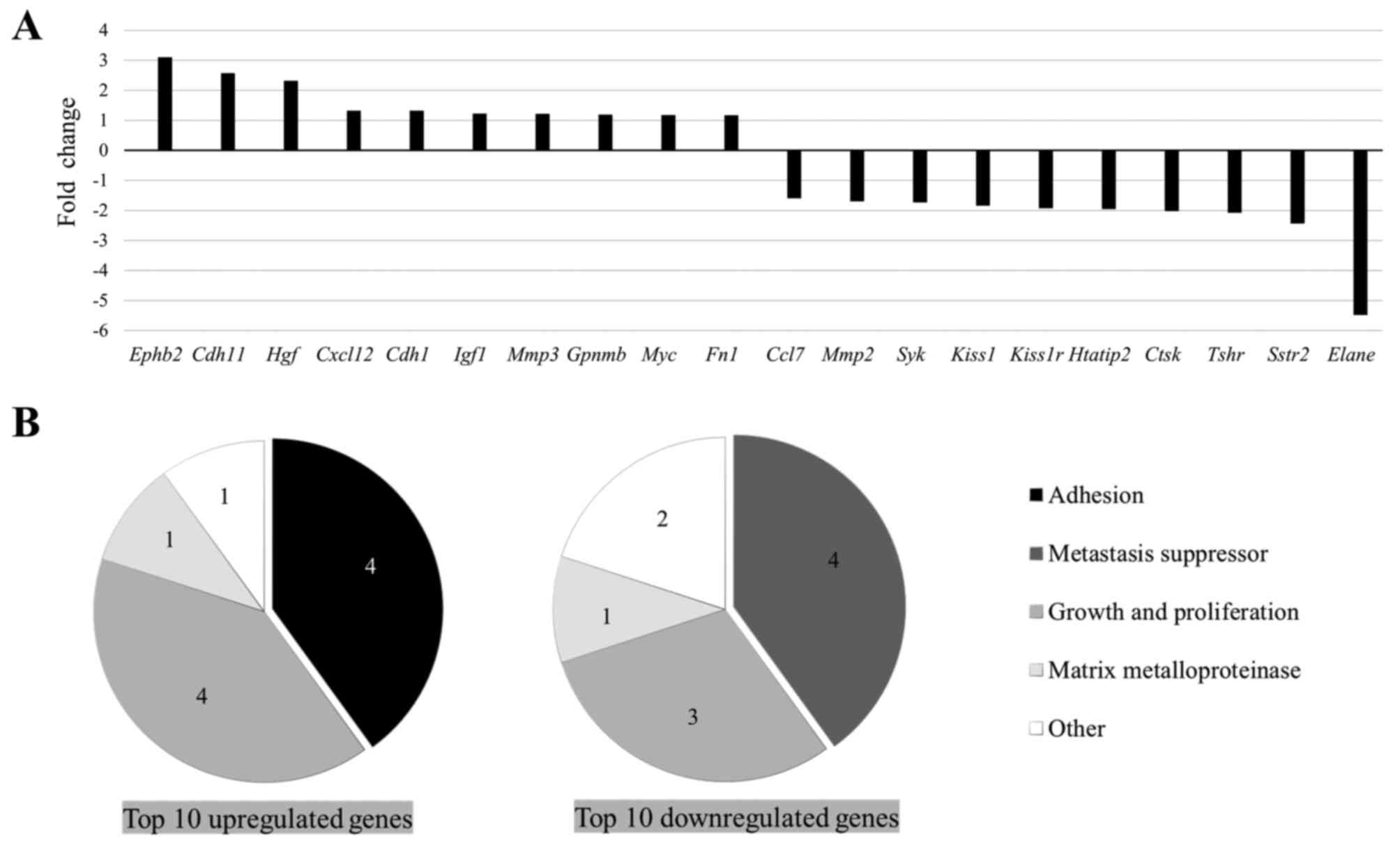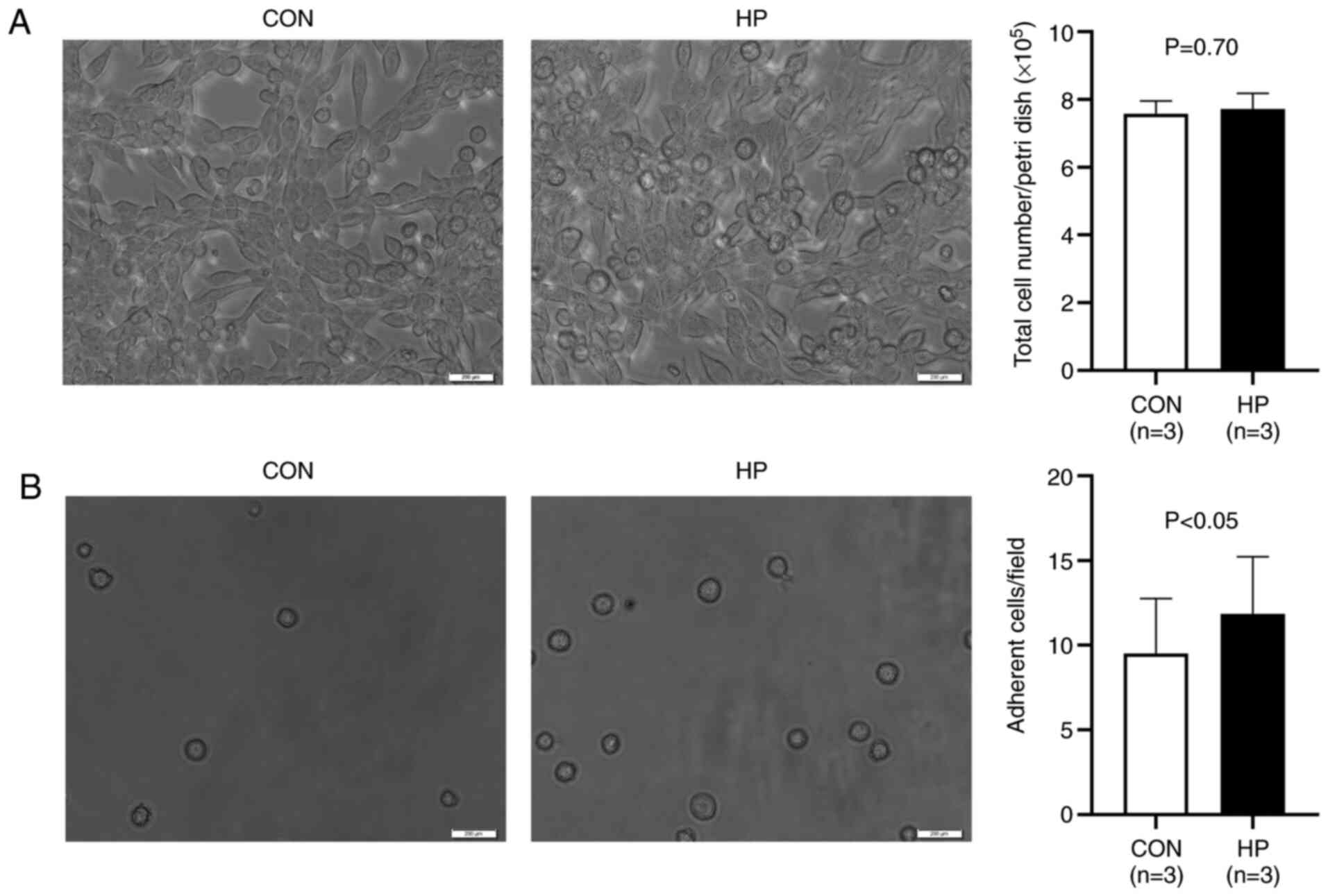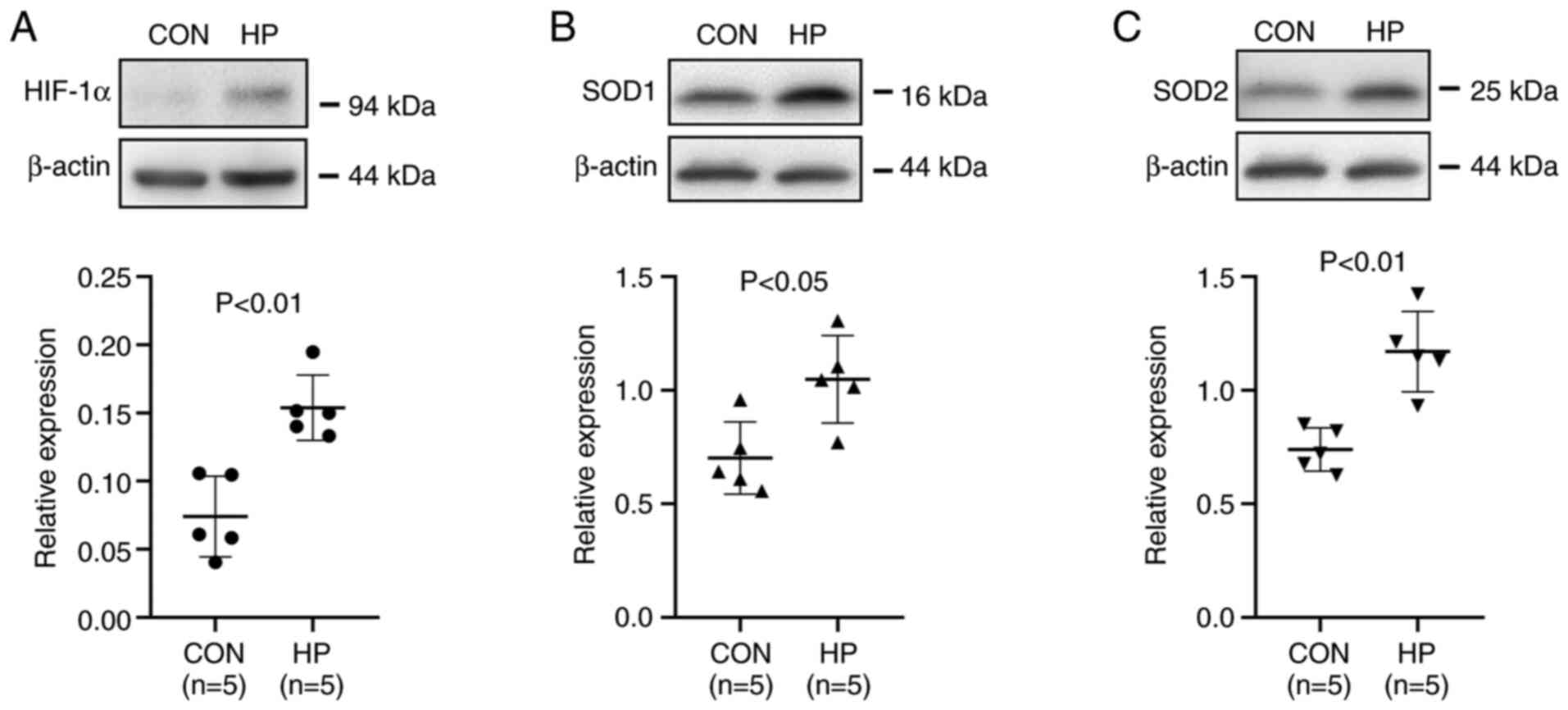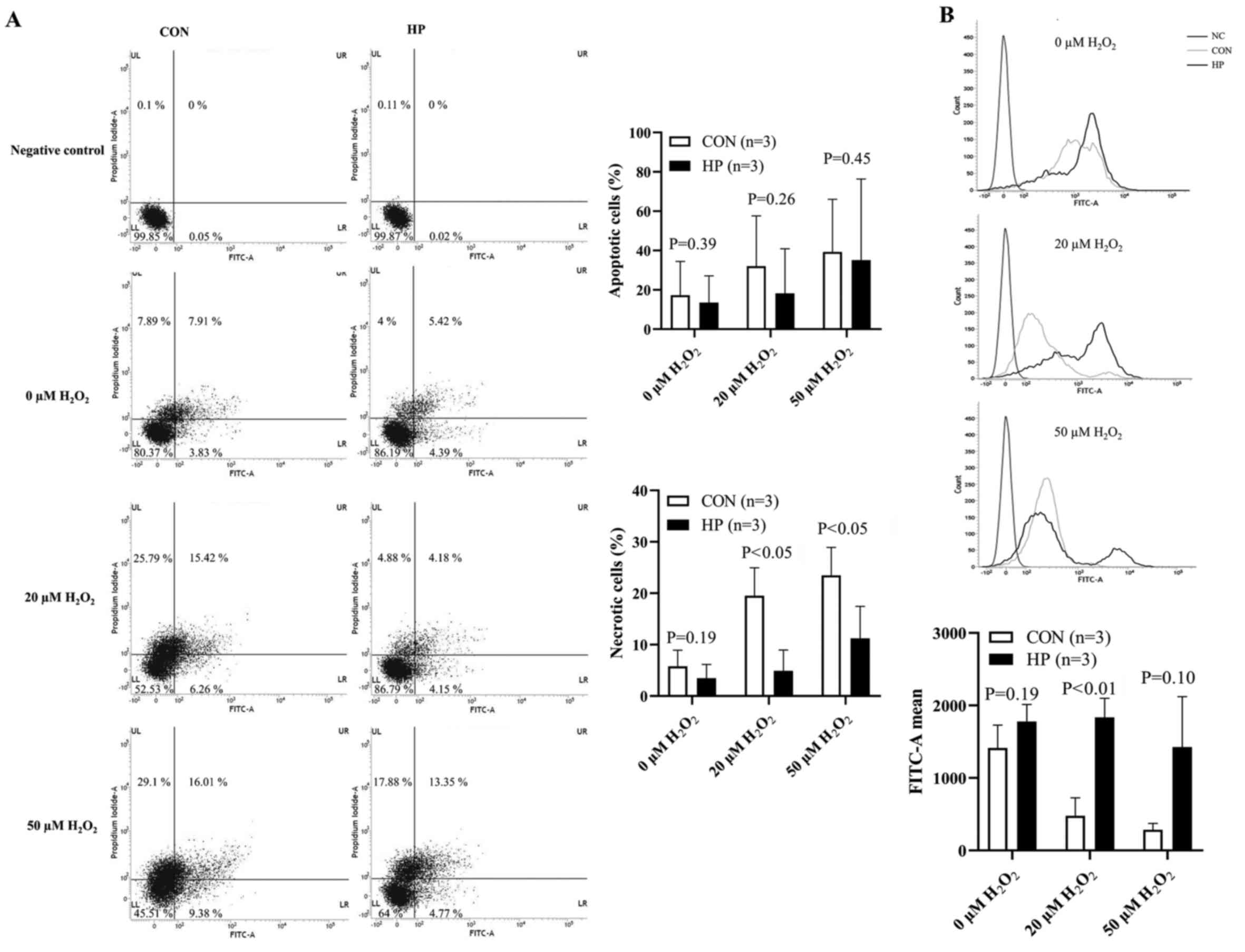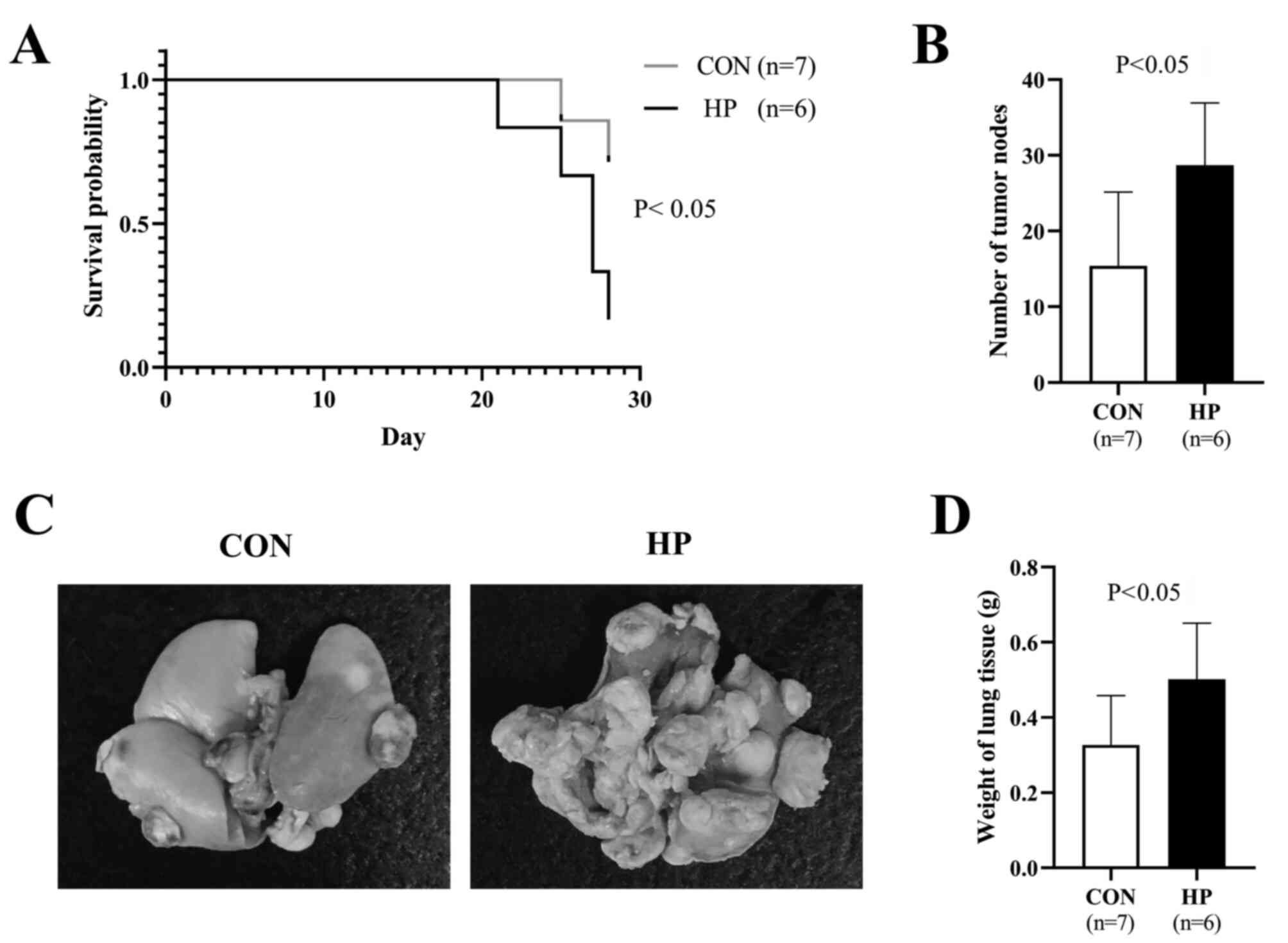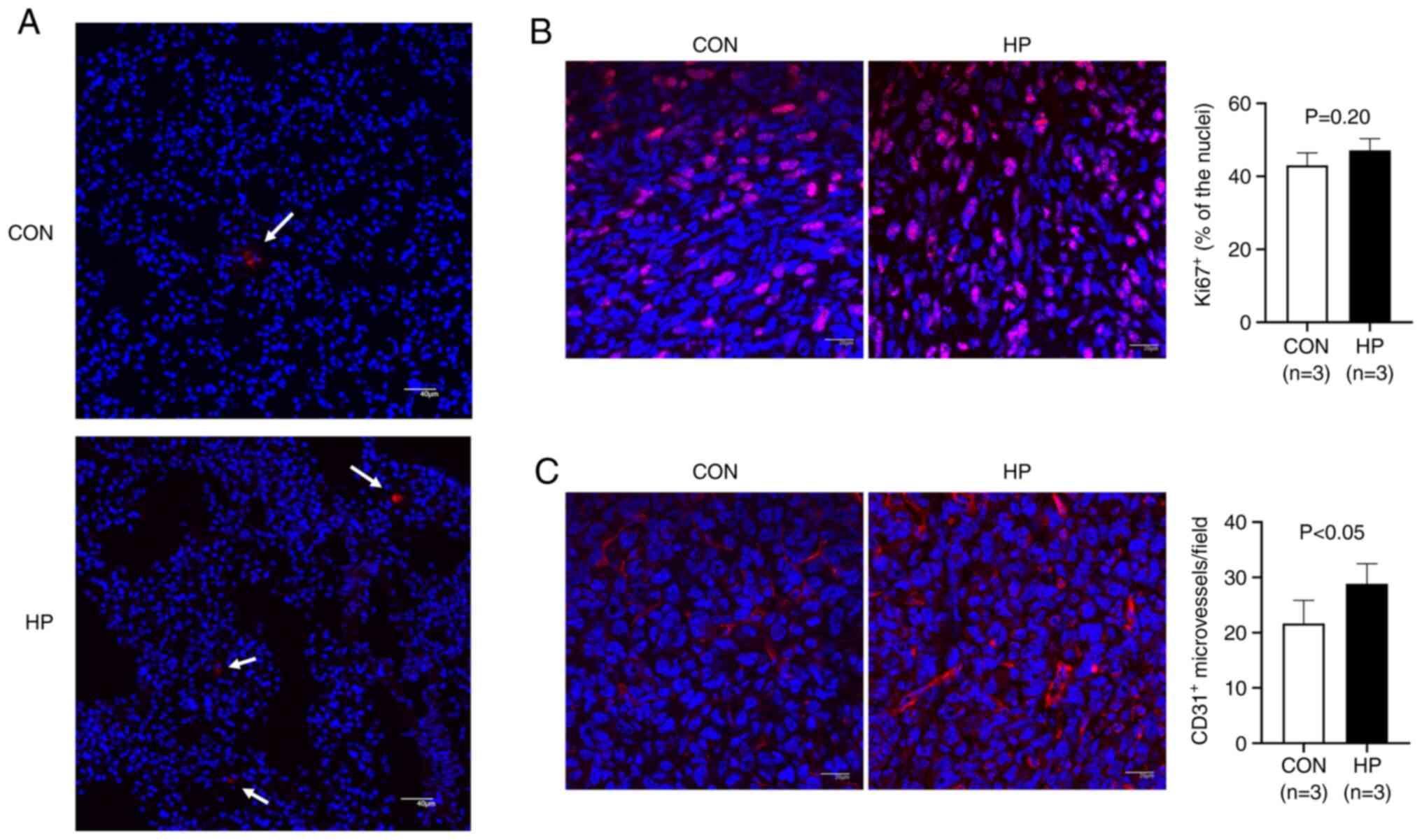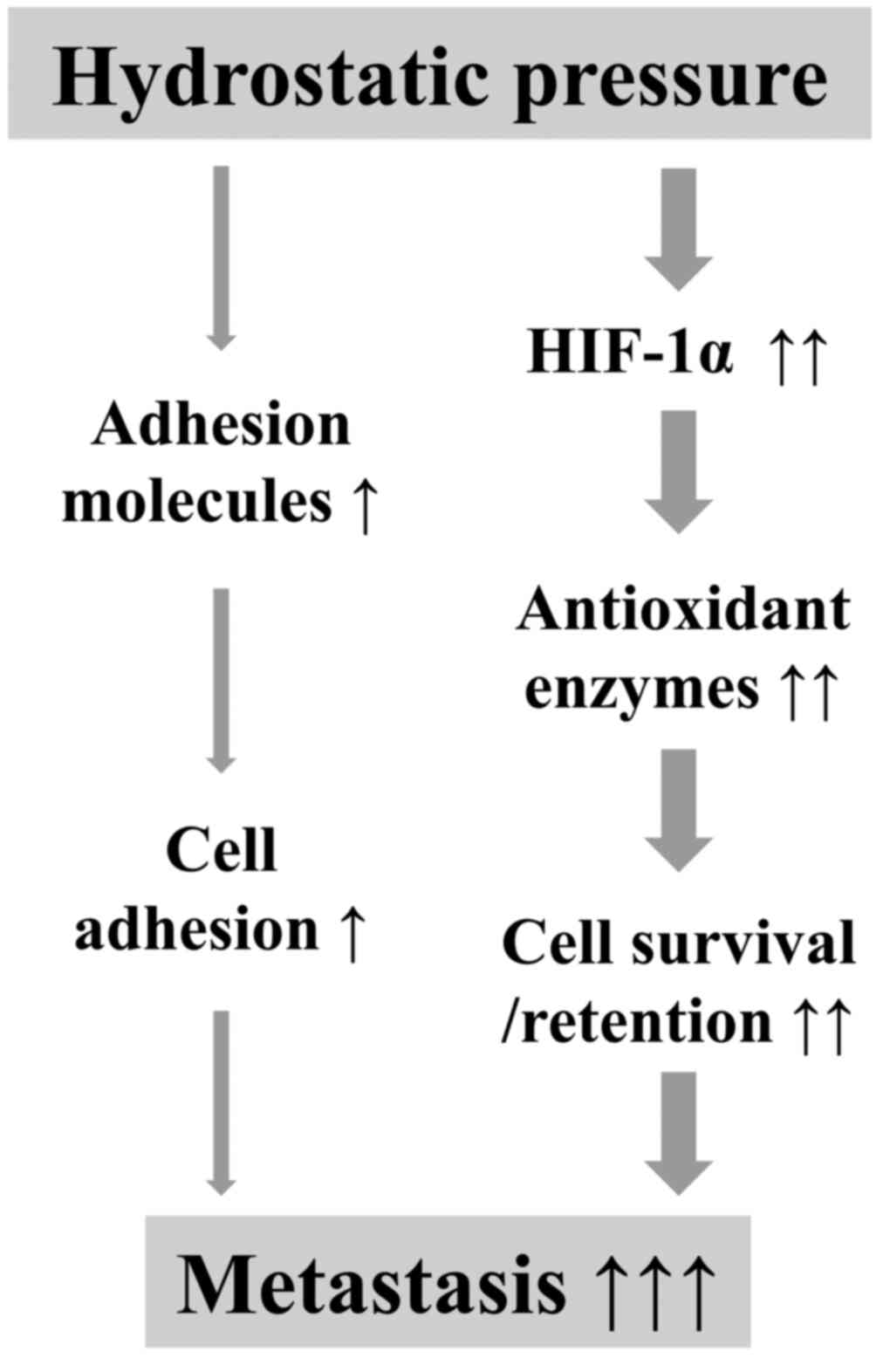|
1
|
Brabletz T, Lyden D, Steeg PS and Werb Z:
Roadblocks to translational advances on metastasis research. Nat
Med. 19:1104–1109. 2013. View
Article : Google Scholar : PubMed/NCBI
|
|
2
|
Bregenzer ME, Horst EN, Mehta P, Novak CM,
Repetto T and Mehta G: The role of cancer stem cells and mechanical
forces in ovarian cancer metastasis. Cancers. 11:10082019.
View Article : Google Scholar : PubMed/NCBI
|
|
3
|
Eccles SA and Welch DR: Metastasis: Recent
discoveries and novel treatment strategies. Lancet. 369:1742–1757.
2007. View Article : Google Scholar : PubMed/NCBI
|
|
4
|
Fidler IJ: The pathogenesis of cancer
metastasis: The ‘seed and soil’ hypothesis revisited. Nat Rev
Cancer. 3:453–458. 2003. View
Article : Google Scholar : PubMed/NCBI
|
|
5
|
Zijl FV, Krupitza G and Mikulits W:
Initial steps of metastasis: Cell invasion and endothelial
transmigration. Mutat Res. 728:23–34. 2011. View Article : Google Scholar : PubMed/NCBI
|
|
6
|
Piskounova E, Agathocleous M, Murphy MM,
Hu Z, Huddlestun SE, Zhao Z, Leitch AM, Johnson TM, DeBerardinis RJ
and Morrison SJ: Oxidative stress inhibits distant metastasis by
human melanoma cells. Nature. 527:186–191. 2015. View Article : Google Scholar : PubMed/NCBI
|
|
7
|
Vanharanta S and Massague J: Origins of
metastatic traits. Cancer Cell. 24:410–421. 2013. View Article : Google Scholar : PubMed/NCBI
|
|
8
|
Kao YC, Jheng JR, Pan HJ, Liao WY, Lee CH
and Kuo PL: Elevated hydrostatic pressure enhances the motility and
enlarges the size of the lung cancer cells through aquaporin
upregulation mediated by caveolin-1 and ERK1/2 signaling. Oncogene.
36:863–874. 2017. View Article : Google Scholar : PubMed/NCBI
|
|
9
|
Tse JM, Cheng G, Tyrrell JA,
Wilcox-Adelman SA, Boucher Y, Jain RK and Munn LL: Mechanical
compression drives cancer cells toward invasive phenotype. Proc
Natl Acad Sci USA. 109:911–916. 2012. View Article : Google Scholar : PubMed/NCBI
|
|
10
|
Less JR, Posner MC, Boucher Y, Borochovitz
D, Wolmark N and Jain RK: Interstitial hypertension in human breast
and colorectal tumors. Cancer Res. 52:6371–6374. 1992.PubMed/NCBI
|
|
11
|
Nathan SS, DiResta GR, Casas-Ganem JE,
Hoang BH, Sowers R, Yang R, Huvos AG, Gorlick R and Healey JH:
Elevated physiologic tumor pressure promotes proliferation and
chemosensitivity in human osteosarcoma. Clin Cancer Res.
11:2389–2397. 2005. View Article : Google Scholar : PubMed/NCBI
|
|
12
|
Gutmann R, Leunig M, Feyh J, Goetz AE,
Messmer K, Kastenbauer E and Jain RK: Interstitial hypertension in
head and neck tumors in patients: Correlation with tumor size.
Cancer Res. 52:1993–1995. 1992.PubMed/NCBI
|
|
13
|
Solis AG, Bielecki P, Steach HR, Sharma L,
Harman CC, Yun S, de Zoete MR, Warnock JN, To SDF, York AG, et al:
Mechanosensation of cyclical force by PIEZO1 is essential for
innate immunity. Nature. 573:69–74. 2019. View Article : Google Scholar : PubMed/NCBI
|
|
14
|
Rankin EB, Nam JM and Giaccia AJ: Hypoxia:
Signaling the metastatic cascade. Trends Cancer. 2:295–304. 2016.
View Article : Google Scholar : PubMed/NCBI
|
|
15
|
Semenza GL: Hypoxia-inducible factors in
physiology and medicine. Cell. 148:399–408. 2012. View Article : Google Scholar : PubMed/NCBI
|
|
16
|
Semenza GL: Regulation of cancer cell
metabolism by hypoxia-inducible factor 1. Semin Cancer Biol.
19:12–16. 2009. View Article : Google Scholar : PubMed/NCBI
|
|
17
|
Urata Y, Goto S, Luo L, Doi H, Kitajima Y,
Masuda S, Ono Y and Li TS: Enhanced Nox1 expression and oxidative
stress resistance in c-kit-positive hematopoietic stem/progenitor
cells. Biochem Biophys Res Commun. 454:376–380. 2014. View Article : Google Scholar : PubMed/NCBI
|
|
18
|
Hu XQ, Song R and Zhang L: Effect of
oxidative stress on the estrogen-NOS-NO-KCa channel pathway in
uteroplacental dysfunction: Its implication in pregnancy
complications. Oxid Med Cell Longev. 2019:91942692019. View Article : Google Scholar : PubMed/NCBI
|
|
19
|
Novak S, Drenjancevic I, Vukovic R,
Kellermayer Z, Cosic A, Tolusic Levak M, Balogh P, Culo F and
Mihalj M: Anti-inflammatory effects of hyperbaric oxygenation
during DSS-induced colitis in BALB/c mice include changes in gene
expression of HIF-1α, proinflammatory cytokines, and antioxidative
enzymes. Mediators Inflamm. 2016:71414302016. View Article : Google Scholar : PubMed/NCBI
|
|
20
|
Jain RK, Martin JD and Stylianopoulos T:
The role of mechanical forces in tumor growth and therapy. Annu Rev
Biomed Eng. 16:321–346. 2014. View Article : Google Scholar : PubMed/NCBI
|
|
21
|
Senger DR, Galli SJ, Dvorak AM, Perruzzi
CA, Harvey VS and Dvorak HF: Tumor cells secrete a vascular
permeability factor that promotes accumulation of ascites fluid.
Science. 219:983–985. 1983. View Article : Google Scholar : PubMed/NCBI
|
|
22
|
Liu YL, Horning AM, Lieberman B, Kim M,
Lin CK, Hung CN, Chou CW, Wang CM, Lin CL, Kirma NB, et al: Spatial
EGFR dynamics and metastatic phenotypes modulated by upregulated
EphB2 and Src pathways in advanced prostate cancer. Cancers
(Basel). 11:19102019. View Article : Google Scholar : PubMed/NCBI
|
|
23
|
Sato S, Vasaikar S, Eskaros A, Kim Y,
Lewis JS, Zhang B, Zijlstra A and Weaver AM: EPHB2 carried on small
extracellular vesicles induces tumor angiogenesis via activation of
ephrin reverse signaling. JCI Insight. 4:e1324472019. View Article : Google Scholar : PubMed/NCBI
|
|
24
|
Makaryan V, Zeidler C, Bolyard AA, Skokowa
J, Rodger E, Kelley ML, Boxer LA, Bonilla MA, Newburger PE,
Shimamura A, et al: The diversity of mutations and clinical
outcomes for ELANE-associated neutropenia. Curr Opin Hematol.
22:3–11. 2015. View Article : Google Scholar : PubMed/NCBI
|
|
25
|
Nakashima R, Goto Y, Koyasu S, Kobayashi
M, Morinibu A, Yoshimura M, Hiraoka M, Hammond EM and Harada H:
UCHL1-HIF-1 axis-mediated antioxidant property of cancer cells as a
therapeutic target for radiosensitization. Sci Rep. 7:68792017.
View Article : Google Scholar : PubMed/NCBI
|
|
26
|
Semenza GL: Pharmacologic targeting of
hypoxia-inducible factors. Annu Rev Pharmacol Toxicol. 59:379–403.
2019. View Article : Google Scholar : PubMed/NCBI
|
|
27
|
Zhong H, De Marzo AM, Laughner E, Lim M,
Hilton DA, Zagzag D, Buechler P, Isaacs WB, Semenza GL and Simons
JW: Overexpression of hypoxia-inducible factor 1alpha in common
human cancers and their metastases. Cancer Res. 59:5830–5835.
1999.PubMed/NCBI
|
|
28
|
Talks KL, Turley H, Gatter KC, Maxwell PH,
Pugh CW, Ratcliffe PJ and Harris AL: The expression and
distribution of the hypoxia-inducible factors HIF-1alpha and
HIF-2alpha in normal human tissues, cancers, and tumor-associated
macrophages. Am J Pathol. 157:411–421. 2000. View Article : Google Scholar : PubMed/NCBI
|
|
29
|
Generali D, Berruti A, Brizzi MP, Campo L,
Bonardi S, Wigfield S, Bersiga A, Allevi G, Milani M, Aguggini S,
et al: Hypoxia-inducible factor-1alpha expression predicts a poor
response to primary chemoendocrine therapy and disease-free
survival in primary human breast cancer. Clin Cancer Res.
12:4562–4568. 2006. View Article : Google Scholar : PubMed/NCBI
|
|
30
|
Aebersold DM, Burri P, Beer KT, Laissue J,
Djonov V, Greiner RH and Semenza GL: Expression of
hypoxia-inducible factor-1alpha: A novel predictive and prognostic
parameter in the radiotherapy of oropharyngeal cancer. Cancer Res.
61:2911–2916. 2001.PubMed/NCBI
|
|
31
|
Nanni S, Benvenuti V, Grasselli A, Priolo
C, Aiello A, Mattiussi S, Colussi C, Lirangi V, Illi B, D'Eletto M,
et al: Endothelial NOS, estrogen receptor beta, and HIFs cooperate
in the activation of a prognostic transcriptional pattern in
aggressive human prostate cancer. J Clin Invest. 119:1093–1108.
2009. View Article : Google Scholar : PubMed/NCBI
|
|
32
|
Semenza GL: Defining the role of
hypoxia-inducible factor 1 in cancer biology and therapeutics.
Oncogene. 29:625–634. 2010. View Article : Google Scholar : PubMed/NCBI
|
|
33
|
Apte RS, Chen DS and Ferrara N: VEGF in
signaling and disease: Beyond discovery and development. Cell.
176:1248–1264. 2019. View Article : Google Scholar : PubMed/NCBI
|
|
34
|
Dvorak HF: Vascular permeability
factor/vascular endothelial growth factor: A critical cytokine in
tumor angiogenesis and a potential target for diagnosis and
therapy. J Clin Oncol. 20:4368–4380. 2002. View Article : Google Scholar : PubMed/NCBI
|
|
35
|
Kellar A, Egan C and Morris D: Preclinical
murine models for lung cancer: Clinical trial applications. Biomed
Res Int. 2015:6213242015. View Article : Google Scholar : PubMed/NCBI
|
|
36
|
Mori T, Koga T, Shibata H, Ikeda K,
Shiraishi K, Suzuki M and Iyama K: Interstitial fluid pressure
correlates clinicopathological factors of lung cancer. Ann Thorac
Cardiovasc Surg. 21:201–208. 2015. View Article : Google Scholar : PubMed/NCBI
|















